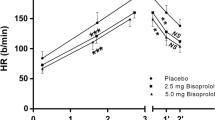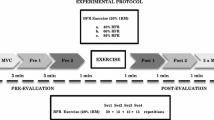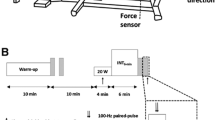Abstract.
This study analysed the effect of selective β1-blockade on neuromuscular recruitment characteristics during progressive endurance exercise. Ten healthy subjects ingested a selective β1-blocker, acebutolol (200 mg b.d.), for 7 days (for one of two cycling trials), with a 10-day wash-out period between trials. On the last day of acebutolol ingestion subjects performed three successive 15-min rides at 30%, 50% and 70% of their peak power output and then cycled at increasing (15 W min–1) work rates to exhaustion. Force output, heart rate, submaximal V˙O2, rate of perceived exertion (RPE), electromyographic (EMG) data and blood lactate were captured during the cycling activity. Peak work rate [270 (111) W vs 197 (75) W, CON vs BETA, P <0.01], time to exhaustion [49.7 (23.2) min vs 40.3 (23.7) min, CON vs BETA, P <0.05] and heart rate [mean, for the full ride 135.5 (38.3) beats min–1 vs 111.5 (30.0) beats min–1 CON vs BETA, P <0.05] were significantly lower for the group who ingested β1-blockade (BETA) compared to the control group (CON). Although not significant, submaximal V˙O2 was reduced in BETA during the ride, while RPE was significantly higher during the ride for BETA (P <0.01). Mean integrated electromyography was higher in the BETA group although these differences were not significant. Mean power frequency values of the BETA group showed a significant (P <0.05) shift to the upper end of the spectrum in comparison to the control group. Lactate values [11.7 (3.5) mmol.l–1 vs 7.1 (4.1) mmol.l–1 CON vs BETA] were significantly lower (P <0.05) at exhaustion in BETA. Significant reductions in cycling performance were found when subjects ingested β1-blockers. This study has shown significant shifts to the upper end of the EMG frequency spectrum after β1-blocker ingestion, which could be caused by a change in neuromuscular recruitment strategy to compensate for the impaired submaximal exercise performance.
Similar content being viewed by others
Author information
Authors and Affiliations
Additional information
Electronic Publication
Rights and permissions
About this article
Cite this article
Hunter, A.M., Gibson, A., Derman, W.E. et al. The effect of selective β1-blockade on EMG signal characteristics during progressive endurance exercise. Eur J Appl Physiol 88, 275–281 (2002). https://doi.org/10.1007/s00421-002-0710-5
Accepted:
Issue Date:
DOI: https://doi.org/10.1007/s00421-002-0710-5




